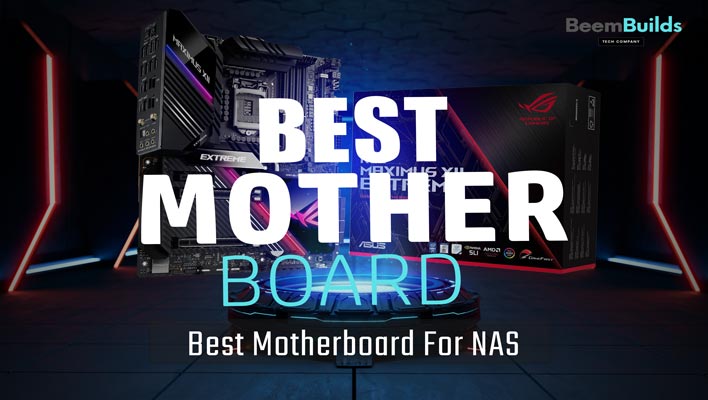A computer system’s motherboard is its core component. Input information and data is processed, and the information and data are displayed on a monitor. If you are looking for a specific model to buy, this article may be helpful to give you an overview of the Best Motherboard For NAS For Home Server 2024.
The priority of the brands when creating nas motherboards is to support the most recent processors. There are other conveniences for users like AMD’s AM4 socket and Intel’s 1200 socket support. The CPU speed of 2400MHz is another benefit besides the ease of installation and setup. Here are our 3 top Best Motherboards for NAS in 2024
9.7
- Brand: Gigabyte
- CPU Socket: Socket AM4
- RAM: DDR4
9.3
- Brand: Gigabyte
- CPU Socket: Socket AM4
- RAM: DDR4
The best motherboard for NAS home servers is one that lets you optimize and customize the system. The PCIe slot spacing should be 16x/8x/16x, and at least two RAM slots should be available. This category usually offers more RAM slots, a maximum of 128GB of storage capacity, and 10 SATA ports.
As well as supporting large CPU coolers (with passive cooling), the motherboard should also be capable of managing multiple GPU configurations. All of the required processors and GPUs are provided by the brands to support gaming rigs. You can use these motherboards for a variety of purposes, including quick file transfers, increased storage, and more. You can also read Best Motherboards For Video Editing.
You will need more storage if you are playing games, modeling, or working at an office. Even with the large storage, the airflow must still be maintained by an authentic cooling system. The system will slow down if it experiences an excessive amount of heat, regardless of how advanced it may be. Thus, smart fan Xpert or ProCool II can be used for this purpose. let’s move into the best motherboard for nas reviews.
Table of Contents
Best Motherboard For NAS in 2024
- ASRock Rack C236 WSI
- ASRock X570M Pro 4
- Gigabyte X570 I AORUS Pro
- Gigabyte C246-WU4
- Gigabyte B550I AORUS Pro AX
- ASUS ROG Strix B460-I
- MSI Performance B450I
- Asus Prime B450M-A II
- ASUS PRIME A520M-K
- ASRock H370 M-ITX AC
1. ASRock Rack C236 WSI – Best Mini ITX NAS Motherboard
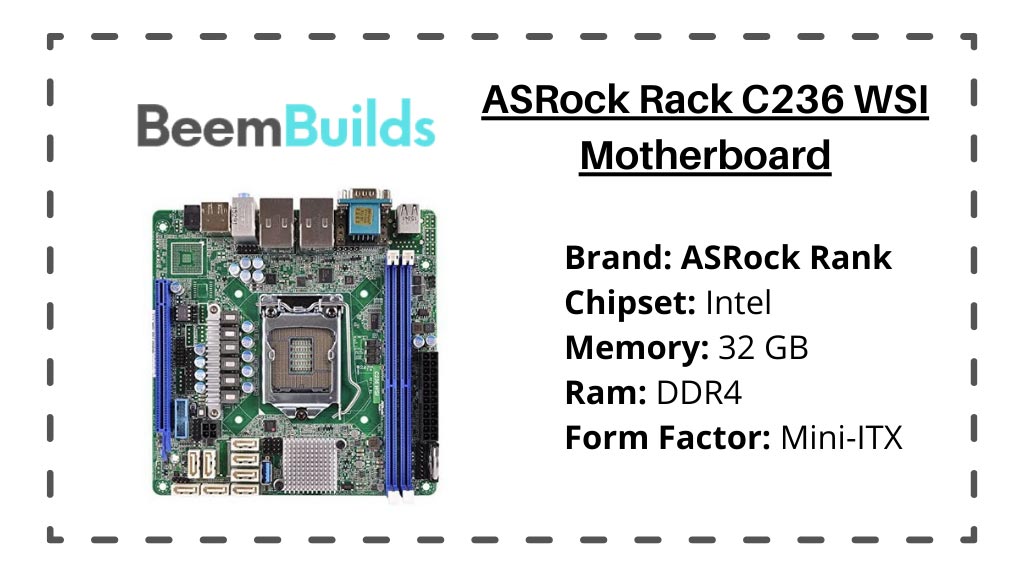 A NAS system can utilize the ASRock Rack C236 WSI Motherboard. What do you mean by asking? Having 8 SATA ports is a huge benefit. Thus, it is possible to use up to eight Storage devices simultaneously. The more storage devices you can connect to your NAS system, the more functionality you will be able to access.
A NAS system can utilize the ASRock Rack C236 WSI Motherboard. What do you mean by asking? Having 8 SATA ports is a huge benefit. Thus, it is possible to use up to eight Storage devices simultaneously. The more storage devices you can connect to your NAS system, the more functionality you will be able to access.
Mini ATX versions of this product are available in dimensions of 6.7 x 6.7 inches. It is possible to build your NAS System compactly using this form factor. In addition to providing you with all the options you require, this would also help you to save space.
Intel I3 and Intel Xeon E3-1200 v5 processors are currently supported. In addition, you can run them at 2333 MHz while supporting up to 32GB of RAM. Furthermore, you can connect both ECC and non-ECC RAM types.
But do not put all your hope in the Rack C236, because it still has some drawbacks. A M.2 port isn’t available on this product considering its price. This mini itx motherboard for nas, which is in the same price range as many others, features M.2s as well.
- Ports for 8 SATA drives
- Micro ATX
- Convenient
- Supports ECC & Non-ECC RAM
- An M.2 slot is not available
- The company is not very famous or popular
Bottom line:
You may encounter problems in terms of customer support with ASRock, since it is the most widely known brand on the market. The whole process might become difficult if the product includes a defect or isn’t performing as it should.
You May also love to read Best Motherboards With WiFi and Bluetooth
2. ASRock X570M Pro 4 – Best NAS Motherboard For Ryzen CPUs
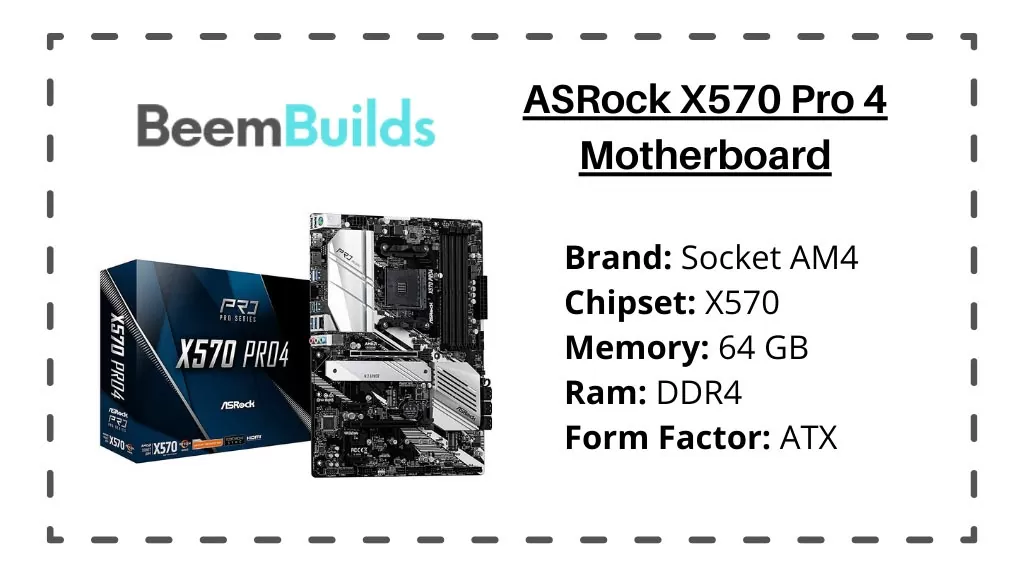 If you are looking for a best nas motherboard that can handle 8 or more storage devices, the ASRock X570M Pro 4 is a great choice.
If you are looking for a best nas motherboard that can handle 8 or more storage devices, the ASRock X570M Pro 4 is a great choice.
Two M.2 ports are included with this hardware component, which has eight SATA ports. These are in the 4x and 16x configurations. You can, therefore, explore expansion and upgradeability later on if you wish.
In addition, these ports will give you the ultimate opportunity to integrate a lot of storage devices into your NAS systems. Additionally, it supports AMD’s Ryzen 2000 & 3000 series processors, which are excellent for NAS systems processors. AMD Ryzen usually has a lower overall cost This Motherboard comes with budget-friendly processors, so you can build a NAS on your own for a reasonable price.
ASRock’s 10 Power Phase Technology is also really cool. The motherboard gets a stable voltage supply with the help of the VRMs.
Rather than Micro ITX, this device uses the Micro ATX form factor, meaning that its dimensions are actually 9.6 x 9.6 inches and not 6.7 x 6.7 inches. If you are building a compact system, you will have a hard time choosing this motherboard.
- Ports for 8 SATA drives
- Ports: 2 M.2
- Long-lasting
- Designed for 10 Power Phases
- There is no Mini ITX form factor but Micro ATX
Bottom line:
In general, you would have to go for the Non-ECC Type of RAM with this device, even though they both support ECC RAM. The ECC RAM is really expensive. So, if you are on a budget, you should go with a Non-ECC RAM type.
You may also love to read Best Motherboards for i7 6700K
3. Gigabyte X570 I AORUS Pro – Best High-End NAS Board
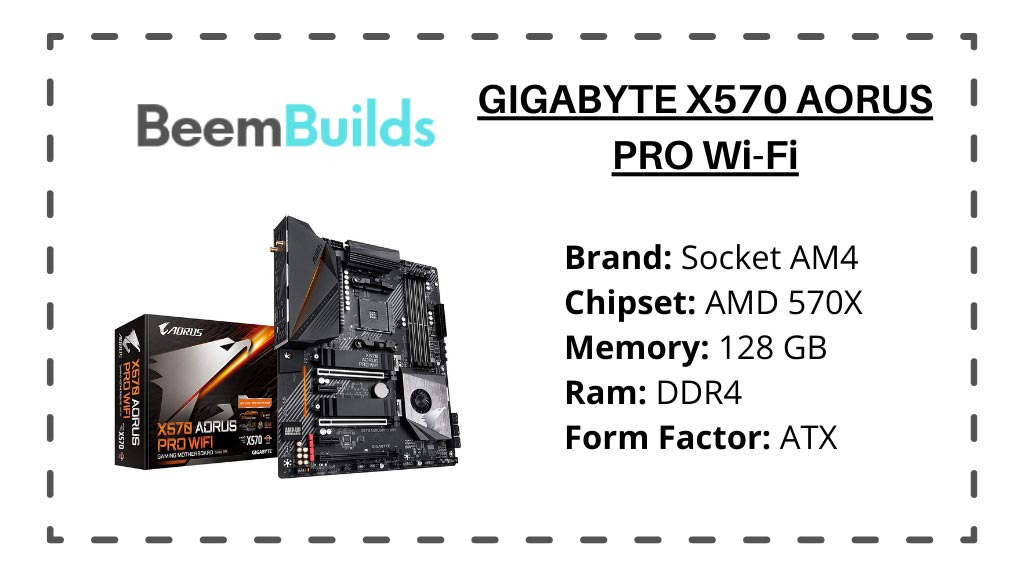 While it was not built to serve as a Network Attached Storage System, the Gigabyte X570 I AORUS Pro can still be used as one. Nevertheless, there are a few considerations to make.
While it was not built to serve as a Network Attached Storage System, the Gigabyte X570 I AORUS Pro can still be used as one. Nevertheless, there are a few considerations to make.
Gigabyte’s X570 I AORUS Pro supports all MAD Ryzen 3000 & 2000 series processors. Due to the fact that it was built primarily for gamers and high-end performances. You’ll have power for days if you buy this product.
You’re getting six SATA interfaces as well as two M.2 slots with the X570. It means that this motherboard is connected to a lot of storage devices. Additionally, up to 64GB of DDR4 RAM can be connected simultaneously.
To combat the 8 Power Phase 70A power stage and its heat, Gigabyte offers an Extended VRM heatsink & 5W/MK thermal pad. Both of these will aid in heat dissipation. A NAS system will not generate a lot of heat, so you may not have significant problems with heat generation.
There are no 90 degree SATA connectors on this motherboard, so connecting the storage devices is somewhat difficult. It is mostly due to the fact that the Motherboard is intended for gamers who generally don’t connect too many Storage devices.
- Heatsinks for VRMs
- There are six SATA ports
- A.2
- Chipset X570
- Investing long-term
- It’s a dull design
- The temperature might rise
Bottom line:
As far as NAS systems are concerned, it is among the top motherboards. As a long-term investment, the Gigabyte X570 offers the option for upgrades. In addition, you will be able to overclock it easily in the future.
You May Also love to read Best Motherboards for Ryzen 7 2700X
4. Gigabyte C246-WU4 – Best Motherboard for NAS Server
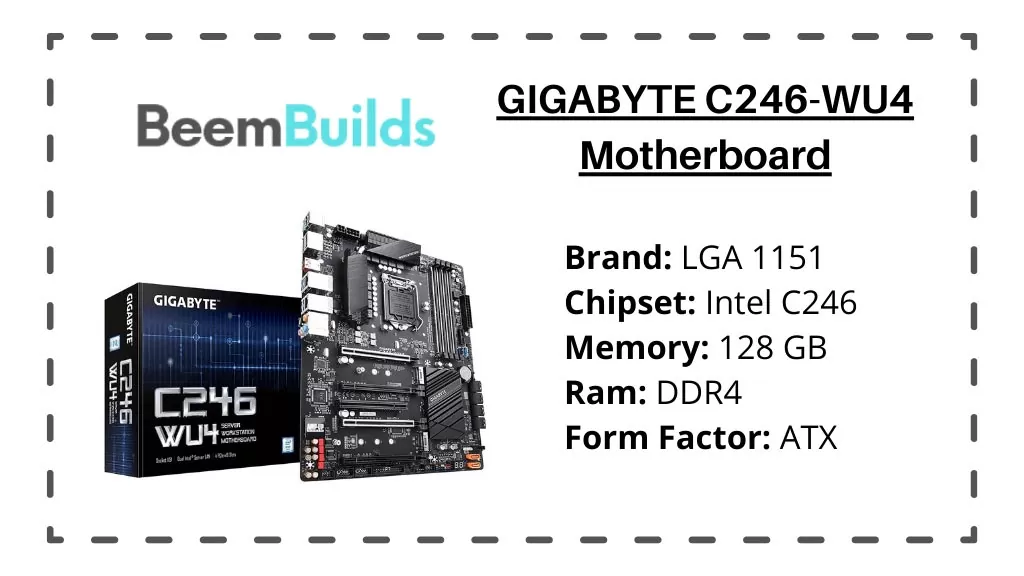 The amount of storage slots is your only concern. Is there anything else you need? In that case, we recommend going with the Gigabyte C246-WU4.
The amount of storage slots is your only concern. Is there anything else you need? In that case, we recommend going with the Gigabyte C246-WU4.
Despite having two M.2 slots and 10 SATA interfaces (in terms of the number of storage slots), it is a monster device. You can therefore use this product simultaneously with 12 different storage devices.
Further, because this motherboard is equipped with AMD’s Crossfire Technology, you can connect up to four GPUs simultaneously. Xeon E1151 processors and Intel Core, Pentium, and Celeron processors of the 9th and 8th generations of the Intel architecture are all compatible. There are a number of options to choose from.
In terms of RAM, you can choose ECC or non-ECC DDR4 RAM with this hardware. Due to all these options, it really is the best Motherboard to get for setting up your DIY NAS setup.
Firstly, this device is ATX-compatible. Second, there are two possible drawbacks depending on whether these are serious concerns or not. Format standard. Therefore, the case that you get for this Motherboard should be large. As such Consequently, if you’re planning to build a Compact NAS setup, this product isn’t right for you.
- Ports for 10 SATA drives
- Ports: 2 M.2
- You have a lot of storage options
- Dependable
- Crossfire from AMD
- Inexpensive
- Form factor standard ATX
Bottom line:
Overall, because of all the options this Motherboard provides, it ends up being somewhat expensive. It’s not an unjustified price tag as it brings a lot of functionality, but if you’re looking for a budget build for your NAS, then this might not be the motherboard for you.
Also read Best White Motherboards For Gaming
5. Gigabyte B550I AORUS Pro AX – Best Server Motherboard For AMD Ryzen
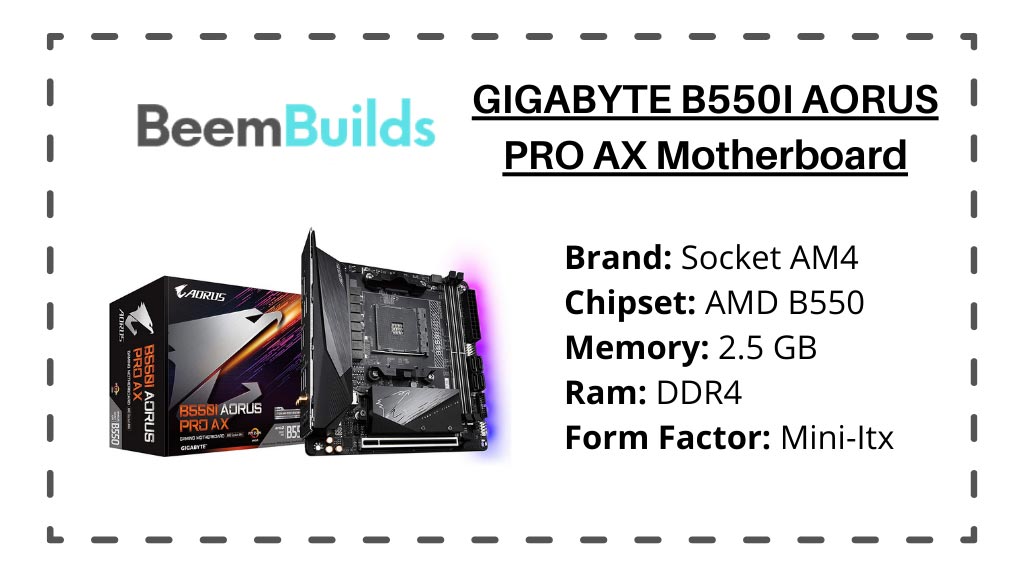 Do you need a Motherboard for your Network Storage System that will last a long time? Gigabyte’s B550I AORUS Pro AX is what you need.
Do you need a Motherboard for your Network Storage System that will last a long time? Gigabyte’s B550I AORUS Pro AX is what you need.
This Pro AX comes with four SATA ports and two M.2 ports. Therefore, you are able to connect up to six storage devices at once.
Gigabyte’s B550I offers you the choice of a Ryzen 3rd Generation processor. If you have a compatible processor, your system will run properly.
Heat management has improved a great deal at Gigabyte. For a lot of money, you get Thermal Guards for all of your M.2 slots, Baseplates, and Extended Heatsinks. Therefore, Gigabyte provides you with the necessary protection when overclocking.
It is also equipped with WiFi 6. It’s not much of a benefit if you plan to use it for NAS only. In addition, you receive a Direct 8 Phases Digital Power with a 90A Smart Power Stage. As a result, your system will always have the power it needs, and your data will always be accessible.
Nevertheless, we see a few cons with this device, such as its inability to work with AMD’s Ryzen 3000 Series. With the VX2000’s BIOS update, the VX5000 Series processors have been supported, so your options are pretty limited compared to other boards.
- The total number of storage slots is six
- Thermodynamic Efficiency
- Efficacious
- RAMs that are compatible with both ECC and non-ECC types
- 8 Phases Direct Digital Power with 90A Smart Power Stag
- AMD Ryzen 3000 & 5000 series only
Bottom line:
Gigabyte B550I AORUS Pro AX also tends to stop working when you change the BIOS yourself, as some users have complained. No matter how much research you did. Basically, this motherboard is for people who would just like to plug their product in and never make any changes to it.
6. ASUS ROG Strix B460-I – Best Gaming Motherboard For Nas
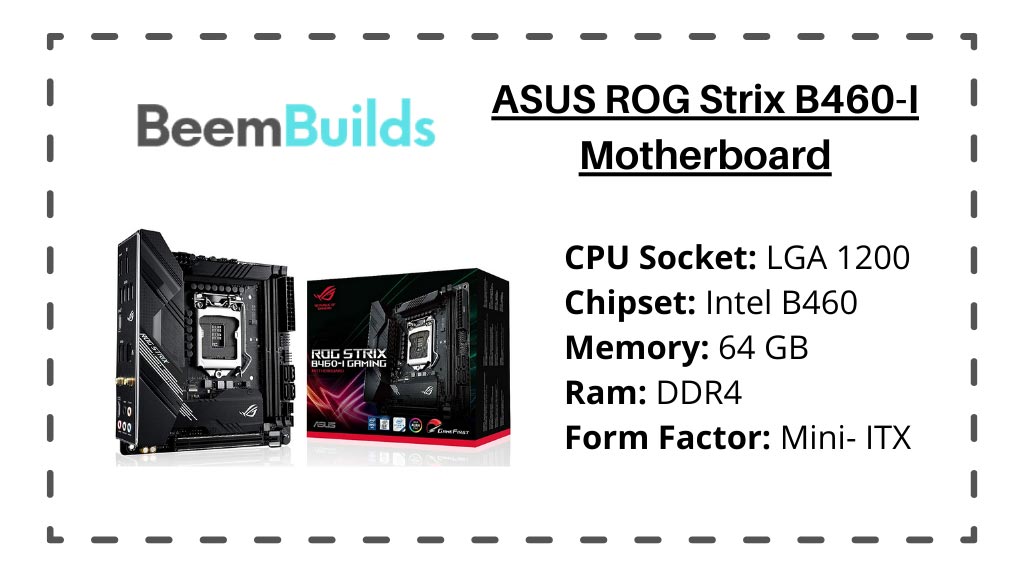 What are your plans for a NAS system? That’s what you’re looking at if you go all out with the ASUS ROG Strix B460-I. It’s an easy choice if you want a Motherboard for your NAS System that’s highly reliable and powerful.
What are your plans for a NAS system? That’s what you’re looking at if you go all out with the ASUS ROG Strix B460-I. It’s an easy choice if you want a Motherboard for your NAS System that’s highly reliable and powerful.
In addition, extended heatsinks help optimize thermals. Additionally, ASUS has added 6+2+1 Dr. MOS power stages with a ProCool power connector to ensure the power is delivered at the right levels when the Motherboard is being pushed to its limits. All of these are paired with durable capacitors and alloy chokes.
Only Intel 10th Generation Processors are compatible with this Motherboard. This means you will end up spending a lot of money. If you are looking for only a budget build, we suggest you choose the more cost-effective options described here.
- Power stages with 6+2+1 Dr. MOS and ProCool connector
- Thermal optimization
- Heatsinks that extend
- Accept durable capacitors and chokes
- If used with Intel’s 10th generation processor, it is quite expensive
Bottomline:
Last but not least, the ROG offers you every option you could ever need. Moreover, it has four SATA and two M.2 slots. Furthermore, you can connect up to six storage devices to the ASUS lighting.
7. MSI Performance B450I – Best performance Motherboard For Nas
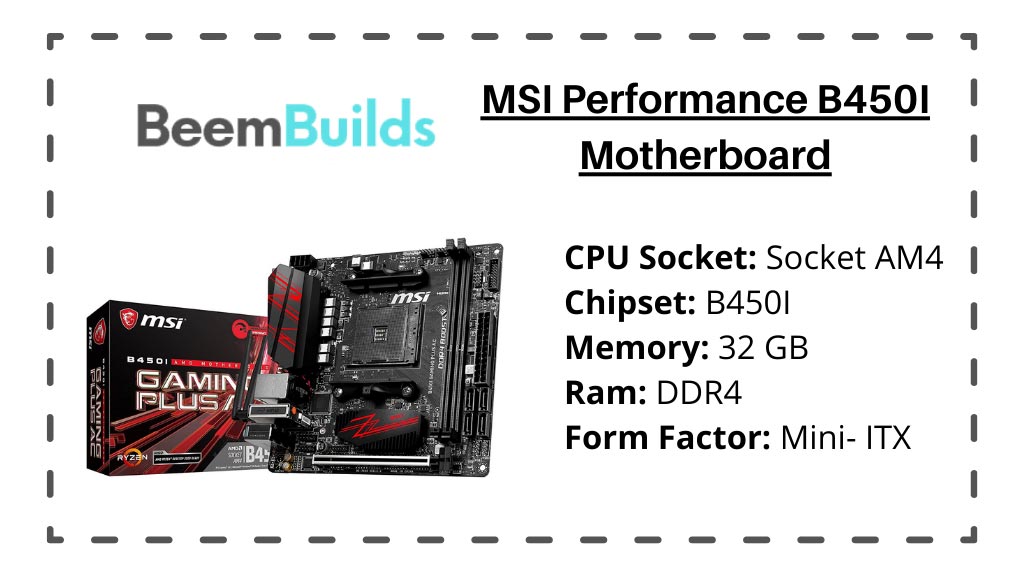 What is the least expensive option you can find? This Best Motherboard For NAS comes at a budget-friendly price tag, but it also ends up as the lowest package overall, since it supports AMD Ryzen processors of generation 1 and 2.
What is the least expensive option you can find? This Best Motherboard For NAS comes at a budget-friendly price tag, but it also ends up as the lowest package overall, since it supports AMD Ryzen processors of generation 1 and 2.
The rest of it does not require much compromise. A single M.2 port is included, as well as four SATA ports. Memory capacity is 32GB, and speeds reach up to 3466MHz for the RAM.
As we mentioned, there are not a lot of compromises, and you get a lot of power as well. If you want, you can even go into the world of virtual reality.
Despite its benefits, this Motherboard has a couple of drawbacks. Due to its incompatibility with newer processor generations, it cannot be used. You might have difficulty upgrading it in the future because of this.
- There wasn’t a lot of compromises
- Price range
- Compatibility with many different RAM speeds
- There might not be enough ports
Bottom line:
There are only 5 ports on this Motherboard. There are fewer Storage Ports on this device than any other device. Moreover, they may not be sufficient for NAS systems
8. Asus Prime B450M-A II – Best Cheap NAS Motherboard
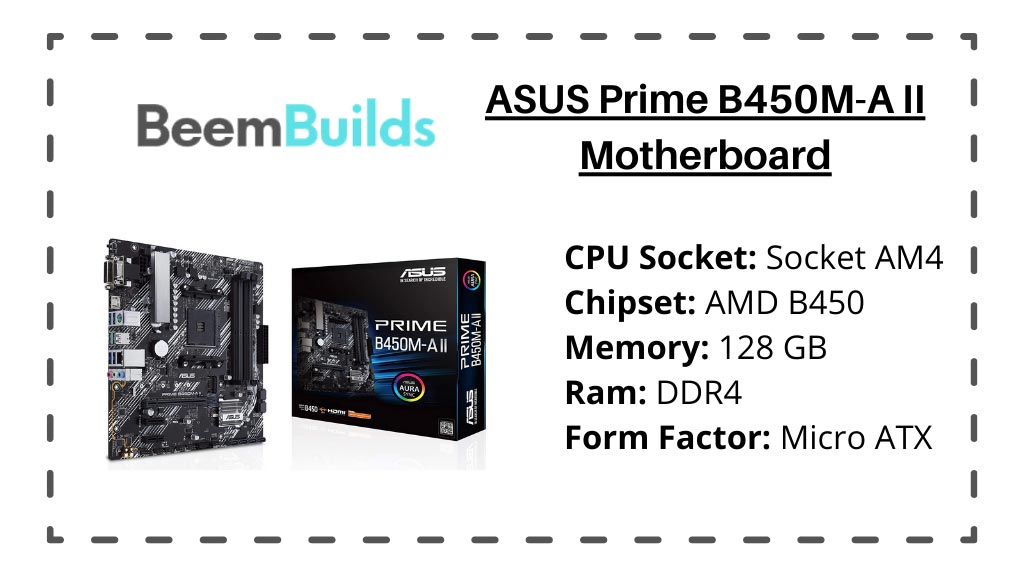 The second micro ATX board is very affordable and suitable for AMD builds. Although it does not have 8 SATA ports, it is significantly less expensive than the motherboard listed above.
The second micro ATX board is very affordable and suitable for AMD builds. Although it does not have 8 SATA ports, it is significantly less expensive than the motherboard listed above.
There are a total of 6 SATA ports on this motherboard. There isn’t often a motherboard with so many SATA ports, for such a low price tag. In most cases, you’ll find as few as 2 or 4 SATA ports.
The motherboard with 6 SATA ports above is, in reality, a better deal than one with just 4 at this price range.
A Ryzen 3 processor from a relatively newer generation can be used instead for a budget NAS build.
Here is the cherry on top, there are more PCIe slots to expand on this than a mini ITX motherboard. Thus, if additional PCIe SATA expansion cards are needed in the future, you can choose to add them.
This is the perfect motherboard for NAS if you’re on a budget and you’re going to have a fair number of SATA ports
- A VRM and PCH heatsink with a large surface area
- Tweaking for the serious tweaker
- Hardware safeguards for all-around system protection
- Quality of the build on average
- Has no support for AMD CrossFire
Bottom line:
Additionally, this motherboard features an AM4 socket over its predecessor. With AMD’s Am4 socket, the first and fifth generations of Ryzen (5000 series) CPUs can run.
9. ASUS PRIME A520M-K – Best Supermicro Nas Motherboard
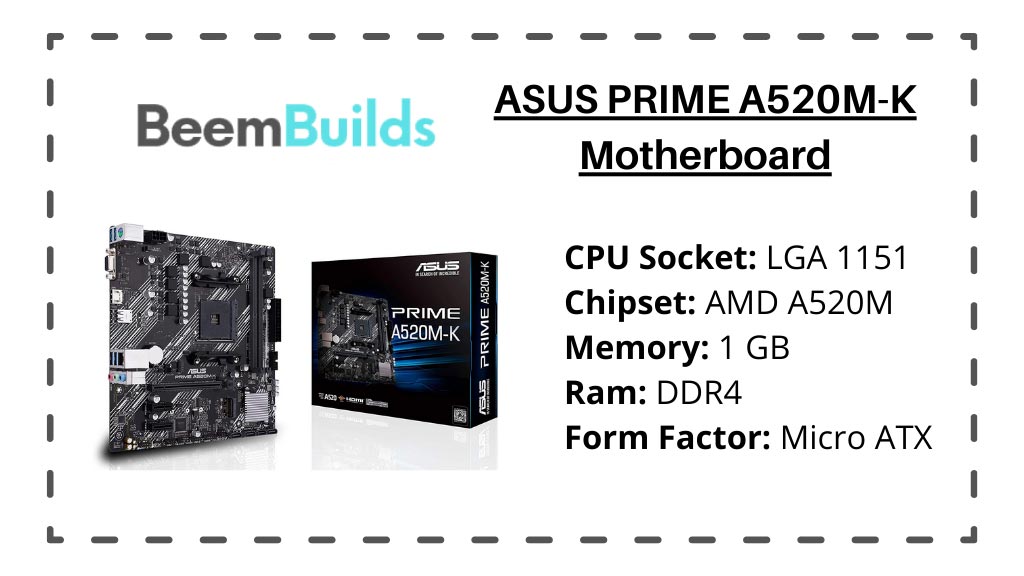 We have compiled a list of the best AMD motherboards on a budget here.
We have compiled a list of the best AMD motherboards on a budget here.
Additionally, it features the AMD A520 chipset, which makes this motherboard one of the best. A few of these advantages make this a superior chipset:
For starters, this version comes with support for AMD’s 5000 series CPUs. The BIOS would not have to be updated, so you don’t have to worry about that.
Secondly, the two x1 slots’ PCIe lanes are based on a chipset that supports PCIe 3.0. PCIe v2.0 was the standard for the A320’s chipset based PCIe lanes.
A faster USB 3.2 Gen 1 port is also included with the newer chipset.
While this may only have 4 ports, the PCIe slots can be used to add SATA expansion cards when required. As a budget AMD, we strongly recommend this for NAS.
- Retention is 1.3x greater
- There is little noise from the fan
- Onboard thermal sensors
- Allows for a brightly lit setup
- The core of the device provides 1.6x better retention
- Memory-related problems
Bottomline:
It has 4 SATA ports. Despite the high number of ports, this is not an overkill. On the other hand, it does have three expansion slots, namely one standard x16 port and two x1 ports that can be used to expand the number of SATA ports available.
10. ASRock H370 M-ITX AC – Best Budget Motherboard for AMD NAS Build
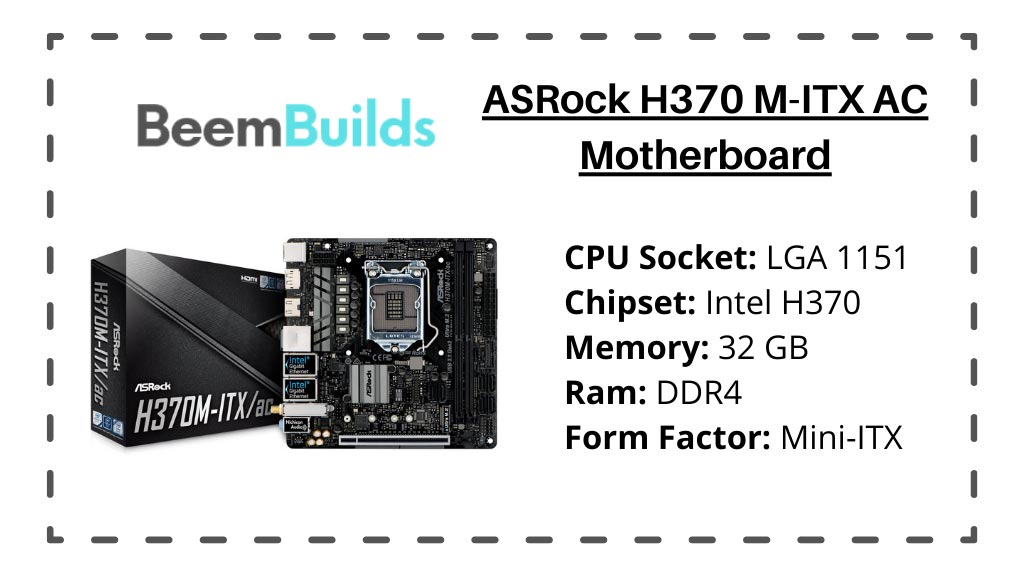 Motherboards and computer components are offered by ASRock, a company focused on computer components. Intel’s 8th Generation Core processors are supported by the H370M, designed by the brand. There are two DIMM slots for memory modules, four DDR4 memory slots with up to 64 GB of RAM support, a PCIe 3.0 x16 slot, an M22 slot for SSDs or WLAN cards, and six USB ports (including a Type-C port).
Motherboards and computer components are offered by ASRock, a company focused on computer components. Intel’s 8th Generation Core processors are supported by the H370M, designed by the brand. There are two DIMM slots for memory modules, four DDR4 memory slots with up to 64 GB of RAM support, a PCIe 3.0 x16 slot, an M22 slot for SSDs or WLAN cards, and six USB ports (including a Type-C port).
In order to be compatible with Intel’s latest processors, ASRock designed the H370M Motherboard. The board offers some unique features, including support for Intel H370 chipsets. This netbook offers a good mix of features and a reasonable price. It has two M.2 slots for NVMe SSDs, as well as USB 3.1 Gen2 Type-A ports.
ASRock’s H370M offers a variety of features to help you get the most out of your PC experience. This processor supports the latest 8th generation Intel socket LGA 1151 so that you can use either the Core i7-8700K or Core i5-8400. 3.7 GHz base clock, 6 threads, and 12 threads (4 threads).
One vertical M.2 Socket (Key E) and six SATA3 storage ports are available. There are two DDR4 memory slots, one PCI-Express 3.0 x16 slot, and two DDR4 hardware RAM slots. High Definition Audio CODEC with Content Protection 7.1 Channels (Realtek S1220A) from Realtek. A powerful audio punch is delivered to your front-panel speakers or headphones over the board to deliver high-quality sound.
- The price is reasonable
- The overall connectivity is excellent
- Multiple display outputs, USB 3.1
- WiFi, dual Gigabit, and M.2 NVMe
- Clean and simple design
- Power components of high quality
- CPU power limit restrictions by default
- This audio codec is from Realtek (ALC892)
- There are limitations to the H370 chipset
Bottom line:
A vertical M.2 socket and two PCIe 3.0 x16 slots round out the features of the ASRock H370M Pro4 Motherboard. With support for both SATA3 and PCIe x4 SSD devices, this motherboard can provide users with exceptional performance for gaming and other demanding applications.
You may also love to read Best DDR3 Motherboards
Buying Guide of Top Best Motherboard For NAS Home Server
Motherboards are the heart of any computer, and selecting the right one for your NAS server can be a challenge. When choosing the best motherboard for home server, you need to consider several factors. Providing guidance through the selection process, these points will cover all the important factors:
-
NUMBER OF STORAGE PORTS
Having a NAS system on your motherboard will require this component. Network Attached Systems are designed so that a lot of data can be stored on them.
The only way you can do this is if you have a couple of Storage ports where you can connect your Storage Devices. Motherboards with these devices come with SATA or M.2 interfaces. It is the motherboard with the most ports that will be the best NAS board.
While SATA, as a Bus interface, is strictly for storage devices, M.2 Ports can be used for anything that is low-powered and can be connected to your PC with a USB port.
Apart from that, M.2 ports are generally faster as well. However, you’ll find that SATA ports are generally a lot more numerous. Motherboards with a lot of M.2 ports are available, but they can be really expensive.
-
FORM FACTOR
An attached system’s motherboard should also have a form factor. NAS systems almost always have built-in space-saving technology. You won’t need to deal with a lot of large cases either.
One of the reasons is that you don’t need a large setup or case. It’s not like you will need graphics cards or liquid cooling.
The most common form factor is the Mini ITX. This form factor is a little more expensive, as the manufacturers need to cram in a lot more components in a smaller space, but it offers the best size to port ratio.
-
SOCKET
Another important consideration is the type of socket that your hardware supports. It is extremely important since if your Motherboard doesn’t support the type of socket your Processor has, you may end up replacing one of them.
Hence, before you buy the product or the processor, make sure it’s compatible with the one you have or ordered.
-
PROCESSORS
This is partly because Network Attached Systems require very little computational power. Thus, you do not need to spend time or money deciding which processor to buy or how powerful it should be.
NAS systems are only responsible for storing and retrieving data. Even Intel Core i3’s, Intel Celeron’s, and AMD Ryzen 2 processors will be able to do so.
-
RAM
RAM for your system does not require a lot of money, either. Power and processing aren’t a big issue with these NSA Systems, so RAM won’t be necessary for them.
Our recommendation would be to get at least 8GBs of RAM. A minimum of 4GBs is needed, however it isn’t a viable solution. You and your work might be slowed down by bottlenecking and other problems.
Thus, 8GB of RAM would be enough for a while to future-proof your system. Modern products support at least 16GBs of RAM. Even if you do not choose a device that we have described, your Motherboard would be able to handle the extra RAM without a problem.
Frequently Asked Questions
- How should I choose a NAS motherboard?
In NAS servers, the best motherboards are ones that can be customized and optimized. A PCIe slot spacing of 16x/8x/16x is required, as are two RAM slots and three or four SATA ports.
- NAS: Which processor should I choose?
With its four cores and boost speed of 4.0GHz, the Ryzen 3 3200G is able to reach higher speeds. File storage is ample and transcoding is also possible without going broke.
- UnRAID or FreeNAS: what’s better?
In our opinion, FreeNAS is the better option for those seeking traditional RAID with a tried-and-true volume manager/file system, while UnRAID is better if you need maximum capacity for non-critical data sets
- How can NAS be so expensive
Since they are basic computers, NAS devices tend to be expensive because they need to be powerful enough to manage a drive array, network, and file server.
- A good NAS speed is what?
A fast NAS can transfer data up to a rate of 110 MB/s, but it can be much slower if it lacks any RAID functionality.
Final Words
During our analysis of best motherboards for NAS we took into account some common tips for a DIY setup, including our personal opinions of the best boards.
You don’t need to spend a lot of money to get a NAS system. The answer depends solely on what you intend to accomplish. For an entry level NAS, any motherboard with a budget price will work fine.
Related:
